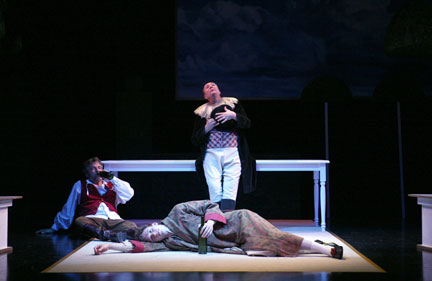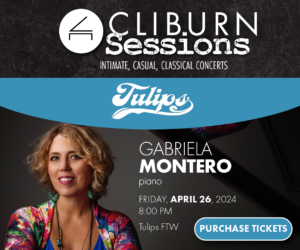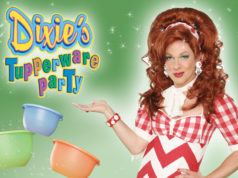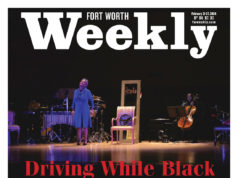Last Friday night’s performance of Twelfth Night proved that Willie’s name is still box-office gold. The house was sold out. But were the good people attending this debut season of Trinity Shakespeare Festival guilty of the sin of “Bardolatry?” The word means “excessive worship of William Shakespeare,” and it was coined with full smart-ass force by the indispensable stage contrarian George Bernard Shaw, whose rapier-sharp objections to the Elizabethan playwright were tinged with more than a little jealousy.
Still, Shaw should never be dismissed easily. Perhaps he had a point when he declared in an 1895 review of All’s Well That Ends Well that the average Shakespeare staging relies on “the author’s reputation and the consequent submission of the British public to be mercilessly bored by each of his plays once in their lives, for the sake of being able to say they have seen it.” Shaw regarded the texts as being burdened with self-conscious verbal gymnastics and rhetorical sleights of hand that held little real insight — at least, little that originated with Shakespeare. A glut of lazy and affected live interpretations in his time compounded the problem, prompting Shaw to lament: “Not a soul has the hardihood to yawn in the face of the impostor.” Ouch!
Any company that wants to produce a Shakespeare script should ask itself this question: “Why?” (“Because it’s Shakespeare” doesn’t cut it as an answer.) Trinity Shakespeare Festival artistic director T.J. Walsh apparently pondered the justification for staging Twelfth Night and came up with the right reason: “Because it’s still funny.” He proves that with his own fast-paced, uncluttered, well-timed production that boldly draws some unexpected characters and moods to the foreground.
Written near the late 1590s, Twelfth Night is a boozy holiday celebration in which nobility mixes with servantry, people fall in love for no reason, and gender identities are fluid. To invoke the mythical land of Illyria, scenic designer Michael Heil has created a marvelously sleek, spare stage dominated by trees that look like crystal-capped lamps, lending the proceedings a nice Art-Deco-from-Mars quality. Stranded after a shipwreck, our heroine, Viola (Susan Helvenston, a bit overwhelmed here), decides her chances of survival are better if she disguises herself as a young man named Cesario. She/he infiltrates the entourage of the Duke Orsino (Jeffrey Schmidt), who is eager in his affections for the countess Olivia (Trisha Miller Smith). Still mourning the deaths of her father and brother, Olivia is not romantically inclined at the moment — at least not until she sets eyes on Cesario/Viola, who’s been charged with wooing Olivia by proxy into the arms of Orsino. Viola, in the meantime, is smitten with her master.
Intertwined is the story of Olivia’s uncle, Toby (J. Brent Alford); her lady in waiting, Maria (Emily Gray); and a titled wastrel named Sir Andrew Aguecheek (Daniel Fredrick), all of whom conspire to humiliate the pompous and puritanical steward Malvolio (David Fluitt) by planting a forged letter suggesting that Olivia is in love with him. (This is where the famous line “Some men are born great, some achieve greatness, and others have greatness thrust upon them” comes from.) As instructed by the letter, Malvolio eagerly dons blazing yellow stockings and manic grin. Deemed a madman by Olivia, he is banished to the dungeon for a round of psychological torture overseen by the clown Feste (David Coffee).
The mayhem in Trinity Shakespeare’s Twelfth Night is surprisingly easy to follow, perhaps because director Walsh has put the actors’ clear and precise delivery at the top of his priorities. It doesn’t hurt that he’s working with a highly skilled cast of actors who seem to have fallen in love with their roles and relay them with precision and passion. There are three towering comic performances here, two of them provided by literally towering actors. Smith, the shortest of the performers, invests Olivia with a beguiling romantic desperation that is noble in its own off-kilter way. As the goofy wannabe suitor Sir Andrew, the beanpole-ish Fredrick, a recent TCU grad, elicits big laughs with the tiniest facial movements: the furrow of his brow or a smug and self-deluding grin. And long-legged Fluitt handles the two sides of Malvolio’s social ambitions — the lunatic and the pathetic — with equal force.
Indeed, this Twelfth Night is impressive in its refusal to gloss over the extreme punishment of Malvolio, one of the most debated scenes in all of Shakespeare’s comedies. His arms in stocks and a sackcloth over his face, Fluitt is unnervingly real and heartbreaking as he begs for the chance to prove he is neither insane nor possessed by a devil. As the fool Feste, Coffee takes such sadistic pleasure in the torment that it colors all the punnery that has gone before with a malevolent streak. As a stock character, the truth-telling Shakespearean clown hasn’t aged well — the “he is a fool yet also the wisest one in the room!” conceit has lost its novelty. Coffee’s Feste, however, wears a surprise set of sharp fangs behind those red lips. Not even George Bernard Shaw could yawn in the face of this scary trickster.
If you’re a reasonably literate person who is routinely less than impressed with the clipped diction and precious puns of the Bard, Shaw the literary lion was on your side. The phenomenon he identified as “Bardolatry” has real consequences, by the way: Public and private arts dollars are often squandered on one 400-year-old English writer rather than divided up to support a much broader body of less-staged classics as well as new works. As a result, Shakespeare provides a well-funded but reflexive distraction for two groups: scholarly cultists with comprehensive knowledge of his canon who enjoy every restaging with a masturbatory relish and general audiences with a good grasp of his themes who still miss about half the dialogue in any given performance but return from a vague sense of cultural duty (or, in my case, professional duty). However, with its thoroughly alive and unpredictable Twelfth Night, Trinity Shakespeare Festival has pledged that entertainment value and fresh perspectives are priorities above mindless adulation.
Twelfth Night
Thru Sun in TCU’s Buschman Theatre, 2800 S University Dr, FW. $20.
817-257-5770.











